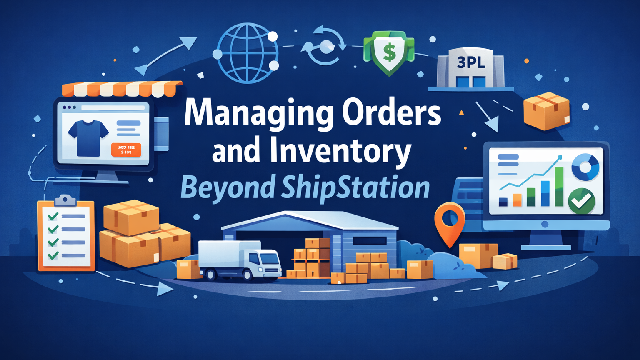Top Techniques for Maximizing B2B Leads
Generating quality B2B leads is crucial for growing your business. You need practical strategies that work. This article dives into proven techniques to maximize your B2B leads. First, understand why lead generation matters and set clear goals. Discover strategies like content marketing, email campaigns, and optimizing your website for conversions. Learn how social media and account-based marketing (ABM) can give you an edge. Next, explore the tools and technologies that make lead generation easier.
From CRM systems to marketing automation tools, find out which ones are worth investing in. You'll also get insights on using data and lead scoring to qualify prospects efficiently. Nurturing leads is just as important. We'll cover best practices, including personalized follow-ups and multi-channel engagement.
Building strong relationships with prospects is key to turning leads into loyal customers. Finally, measuring your success is vital. Learn about key performance indicators (KPIs) and how to use A/B testing to refine your approach. Regular performance reviews and feedback loops will help you improve continuously.
Strategies for Effective B2B Lead Generation
Leveraging Content Marketing
Content marketing is a powerful tool for generating B2B leads. High-quality content attracts potential customers, builds trust, and positions you as an industry leader. Create informative blog posts, whitepapers, and case studies that address common pain points. Use keywords strategically to improve search engine rankings and drive organic traffic. Offering gated content, such as eBooks or exclusive webinars, is a great way to capture leads. Ask visitors to provide their contact information in exchange for valuable resources. This helps you build a robust email list.
Utilizing Email Marketing Campaigns
Email marketing remains one of the most effective strategies for B2B lead generation. Personalized emails can nurture leads through the sales funnel. Segment your email list based on industry, company size, or behavior to send targeted messages. Automate your campaigns to save time and ensure consistency. Use compelling subject lines and clear calls-to-action (CTAs) to increase open and click-through rates. Regularly analyze your campaign performance to refine your approach and achieve better results.
Your website should be a lead-generation machine. Start by ensuring it's mobile-friendly and loads quickly. These factors impact user experience and search rankings. Use clear, concise messaging that speaks directly to your target audience. Incorporate CTAs throughout your site. Place them strategically on landing pages, blog posts, and your homepage. Use forms that are easy to fill out but gather enough information to qualify leads. A/B test different elements, like headlines and button colors, to see what works best.
Harnessing the Power of Social Media
Social media platforms offer scalable solutions for B2B lead generation. LinkedIn is particularly effective for reaching professionals. Share valuable content, engage with followers, and join industry groups to expand your reach. Twitter and Facebook also have their merits. Use these platforms to promote content, run ads, and interact with potential leads. Paid social media campaigns can target specific demographics, making it easier to reach decision-makers.
Implementing Account-Based Marketing (ABM)
Account-based marketing (ABM) is a highly targeted approach. Focus on high-value accounts and tailor your marketing efforts to their specific needs. Collaborate closely with your sales team to identify target accounts and create personalized campaigns. ABM can include personalized emails, bespoke content, and targeted ads. This approach ensures your resources are spent on prospects with the highest potential return. Regularly review your ABM strategy to ensure it's delivering results and adjust as needed.
Tools and Technologies to Enhance Lead Generation
Customer Relationship Management (CRM) Systems
A reliable CRM system is essential for managing and organizing your leads efficiently. It helps you track interactions, segment your contacts, and nurture relationships effectively. Consider popular options like:
a. Salesforce: Known for its robust features and scalability, Salesforce allows you to centralize customer information and streamline your sales processes.
b. HubSpot CRM: Offers a user-friendly interface with tools for managing contacts, tracking deals, and automating tasks, suitable for small to medium-sized businesses.
Marketing Automation Tools
Automating repetitive marketing tasks saves time and improves efficiency in lead generation. Look into:
a. Mailchimp: Besides email marketing, Mailchimp offers automation features to create personalized customer journeys based on user behavior.
b. Marketo: Ideal for enterprise-level businesses, Marketo provides advanced marketing automation capabilities, including lead scoring and nurturing workflows.
Analytics and Data Insights
Analytics tools provide valuable insights into your lead generation efforts, helping you make data-driven decisions. Utilize:
a. Google Analytics: Free and comprehensive, Google Analytics tracks website traffic, user behavior, and conversion metrics.
b. Adobe Analytics: Offers robust analytics solutions with real-time data and customizable reporting for deeper insights into customer behavior.
Lead Scoring and Qualification Tools
Efficiently qualifying leads ensures your sales team focuses on prospects with the highest potential. Tools such as:
a. Leadfeeder: Tracks website visitors and identifies potential leads by integrating with your CRM and other tools.
b. Clearbit: Provides enriched data about leads, helping you prioritize and qualify prospects based on firmographic and behavioral data.
These tools and technologies streamline your lead-generation process and enhance your ability to convert prospects into loyal customers. By leveraging CRM systems, marketing automation tools, analytics, and lead-scoring technologies, you can optimize your efforts and achieve better results in acquiring and nurturing B2B leads.
Best Practices for Nurturing B2B Leads
Nurturing your B2B leads effectively can significantly increase your chances of converting them into paying customers. Here are some proven best practices to guide you:
Personalized Follow-Ups
After initial contact with a lead, personalized follow-ups are crucial. Show genuine interest by referencing specific details from your previous interactions. According to statistics, personalized emails can increase engagement rates by up to 50%.
Segmenting Your Leads
Not all leads are the same. Segmenting your leads allows you to tailor your communication and content to their specific needs and preferences. For instance, a project manager might be interested in different aspects of your product compared to a software developer. This targeted approach can improve conversion rates by delivering relevant information.
Providing Valuable Content
Content is king when it comes to nurturing B2B leads. Focus on providing educational and informative content that addresses your leads' pain points and challenges. Whether it's industry insights, case studies, or how-to guides, valuable content establishes your authority and builds trust. Studies show that companies that publish 16+ blog posts per month generate 4.5 times more leads than those that publish 0-4 posts.
Multi-Channel Engagement
Reach your leads where they are by leveraging multiple communication channels. Combine email, social media, webinars, and even direct calls to engage with your prospects. A diverse approach ensures you stay on your leads' radar without overwhelming them. Research indicates that companies using four or more channels in their lead nurturing strategy see a 300% increase in engagement compared to single-channel efforts. Implementing these best practices can foster stronger relationships with your B2B leads, ultimately driving higher conversion rates and revenue growth. By focusing on personalized interactions, targeted communication, valuable content, and multi-channel engagement, you can optimize your lead nurturing efforts and maximize your chances of success.
Measuring and Analyzing Lead Generation Success
To ensure your B2B lead generation efforts are effective, it's crucial to measure and analyze your success using key performance indicators (KPIs). These metrics help you gauge the performance of your campaigns and adjust strategies as needed. Here are some essential KPIs to track:
a. Key Performance Indicators (KPIs) for Lead Generation Understanding which KPIs matter most can guide your decisions. Track metrics such as conversion rates, lead-to-opportunity ratio, and cost per lead. These indicators give you insights into how well your lead generation efforts are performing and where adjustments are necessary.
b. Conducting Regular Performance Reviews Regularly reviewing your lead generation performance allows you to spot trends and identify areas for improvement. Schedule monthly or quarterly reviews to analyze KPIs, campaign effectiveness, and ROI. Use these reviews to refine your strategies and optimize future campaigns.
c. A/B Testing and Optimization A/B testing involves experimenting with different versions of your marketing assets to see which performs better. Test variables like email subject lines, call-to-action buttons, or landing page designs. Analyze the results to understand what resonates most with your audience and improve conversion rates.
d. Using Feedback for Continuous Improvement Feedback from your sales team, customers, and analytics tools provides valuable insights. Listen to customer feedback on their experience with your lead generation process. Use this information to make data-driven decisions and continuously improve your strategies.
In summary
Mastering B2B lead generation requires a strategic approach tailored to your business goals and audience. By leveraging effective strategies such as content marketing, email campaigns, and social media engagement, you can attract and nurture high-quality leads. Utilizing tools like CRM systems, marketing automation, and analytics empowers you to streamline processes and maximize efficiency.
Remember, successful lead generation is not a one-time effort but an ongoing process of optimization and adaptation. Regularly review your performance metrics and conduct A/B testing to refine your tactics. Personalized follow-ups and providing valuable content remain crucial in building trust and relationships with potential clients.









